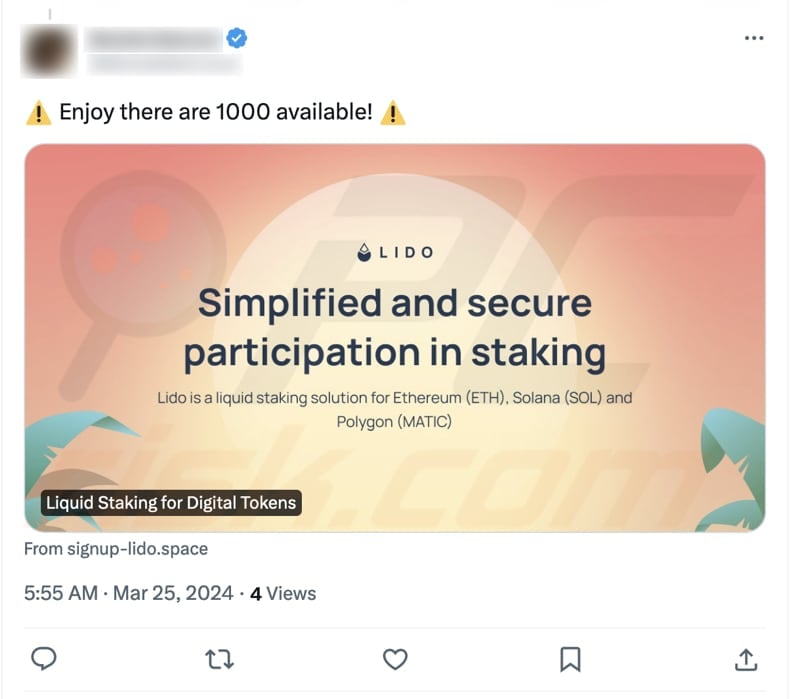How to avoid losing crypto through LIDO Staking scam
Phishing/ScamAlso Known As: LIDO Staking fake platform
Get free scan and check if your device is infected.
Remove it nowTo use full-featured product, you have to purchase a license for Combo Cleaner. Seven days free trial available. Combo Cleaner is owned and operated by RCS LT, the parent company of PCRisk.com.
What is "LIDO Staking" scam?
During our investigation, we discovered that this is a scam (a series of fake websites) masquerading as the official Lido site (lido[.]fi). We found that the individuals behind the LIDO Staking scam are attempting to deceive unsuspecting individuals into taking actions that would result in the depletion of their cryptocurrency wallets.

"LIDO Staking" scam in detail
We discovered the LIDO Staking scam after clicking a misleading advertisement, a link posted on X (formerly Twitter). On the opened scam site, users are offered to stake their ETH (Ether) and earn rewards while maintaining liquidity through the issuance of staked ETH tokens (stETH).
As previously mentioned, there are several fraudulent Lido websites. However, their primary objective remains consistent: deceiving visitors into "connecting" their wallets using the provided form. "Connecting" a wallet on any of these sites initiates the signing of a malicious contract.
Once the contract is signed, a cryptocurrency draining mechanism (a drainer) is activated. Its purpose is to transfer funds from the victim's wallet to the scammer's wallet. In essence, scammers exploit fake Lido pages to pilfer cryptocurrency from "connected" wallets.
This fraudulent activity underscores the importance of vigilance and caution when engaging with online platforms, particularly those involving cryptocurrency transactions. Recovering lost cryptocurrency can be exceedingly challenging and, in many cases, unachievable.
| Name | LIDO Staking fake platform |
| Threat Type | Phishing, Scam, Social Engineering, Fraud |
| Fake Claim | Users can stake their cryptocurrency using the provided platform |
| Disguise | Lefitimate Lido website (lido[.]fi) |
| Fake Lido Websites | stakinglido[.]co, app.lidofinance[.]click, stake.lido-defi[.]fi, lido.com-staked[.]live, lido.com-accelerator[.]app, staking-q9cj3.github[.]io, lidoevent[.]org, staking-1dd0o.github[.]io, staking-a5y16.github[.]io, staking-h1a5o.github[.]io |
| Symptoms | Misspelled domains |
| Distribution methods | Compromised websites, rogue online pop-up ads, potentially unwanted applications. |
| Damage | Loss of sensitive private information, monetary loss, identity theft, possible malware infections. |
| Malware Removal (Windows) |
To eliminate possible malware infections, scan your computer with legitimate antivirus software. Our security researchers recommend using Combo Cleaner. Download Combo CleanerTo use full-featured product, you have to purchase a license for Combo Cleaner. 7 days free trial available. Combo Cleaner is owned and operated by RCS LT, the parent company of PCRisk.com. |
Similar scams in general
Cryptocurrency scams often share common characteristics that help identify them. They frequently promise high returns with little or no risk, exploiting the allure of quick wealth to attract victims. These scams often involve fraudulent investment schemes where early investors are paid returns using funds from new investors, creating a false appearance of profitability.
Overall, cryptocurrency scams often prey on greed, fear of missing out, and ignorance, emphasizing the importance of thorough research and skepticism when engaging in cryptocurrency-related activities. Some examples of scams similar to the LIDO Staking scam are "Ether.fi Scam", "World Games Airdrop", and "Pacmoon Airdrop".
How did I open a scam website?
Fraudsters utilize diverse strategies to ensnare unsuspecting victims. One prevalent tactic involves hijacking verified social media accounts (e.g., Twitter/X accounts), such as those of celebrities or reputable businesses, to promote their scams and redirect users to their fraudulent schemes.
Moreover, individuals might come across scam pages via misleading advertisements, pop-ups, or notifications from dubious sources. Additionally, scammers often register deceptive domain names resembling those of authentic projects to dupe unsuspecting users.
In addition, users may land on pages hosting scams via websites utilizing rogue advertising networks (e.g., torrent sites or illegal movie streaming pages).
How to avoid visiting scam pages?
Remain cautious when handling links in unsolicited emails, particularly those that seem out of context or unexpected. Be cautious of emails and web pages that induce urgency or exhibit suspicious content. Always validate the legitimacy of websites by verifying URLs to ensure they align with official domains.
Exercise prudence when faced with online advertisements and pop-ups, refraining from clicking on them without careful assessment. Refuse to receive notifications from dubious websites. Additionally, employ trustworthy antivirus software and regularly update your systems and applications to bolster security measures.
If your computer is already infected with unwanted apps, we recommend running a scan with Combo Cleaner Antivirus for Windows to automatically eliminate them.
The appearance of "LIDO Staking" pop-up scam (GIF):

Post on X (Twitter) promoting this scam:

Another example of Lido staking-themed drainer website (lido.v3upgrade[.]pro):
![Lido stETH staking scam (lido.v3upgrade[.]pro)](/images/stories/screenshots202601/lido-staking-scam-update-2026-01-27-another-variant.jpg)
Instant automatic malware removal:
Manual threat removal might be a lengthy and complicated process that requires advanced IT skills. Combo Cleaner is a professional automatic malware removal tool that is recommended to get rid of malware. Download it by clicking the button below:
DOWNLOAD Combo CleanerBy downloading any software listed on this website you agree to our Privacy Policy and Terms of Use. To use full-featured product, you have to purchase a license for Combo Cleaner. 7 days free trial available. Combo Cleaner is owned and operated by RCS LT, the parent company of PCRisk.com.
Quick menu:
- What is LIDO Staking fake platform?
- How to identify a pop-up scam?
- How do pop-up scams work?
- How to remove fake pop-ups?
- How to prevent fake pop-ups?
- What to do if you fell for a pop-up scam?
How to identify a pop-up scam?
Pop-up windows with various fake messages are a common type of lures cybercriminals use. They collect sensitive personal data, trick Internet users into calling fake tech support numbers, subscribe to useless online services, invest in shady cryptocurrency schemes, etc.
While in the majority of cases these pop-ups don't infect users' devices with malware, they can cause direct monetary loss or could result in identity theft.
Cybercriminals strive to create their rogue pop-up windows to look trustworthy, however, scams typically have the following characteristics:
- Spelling mistakes and non-professional images - Closely inspect the information displayed in a pop-up. Spelling mistakes and unprofessional images could be a sign of a scam.
- Sense of urgency - Countdown timer with a couple of minutes on it, asking you to enter your personal information or subscribe to some online service.
- Statements that you won something - If you haven't participated in a lottery, online competition, etc., and you see a pop-up window stating that you won.
- Computer or mobile device scan - A pop-up window that scans your device and informs of detected issues - is undoubtedly a scam; webpages cannot perform such actions.
- Exclusivity - Pop-up windows stating that only you are given secret access to a financial scheme that can quickly make you rich.
Example of a pop-up scam:

How do pop-up scams work?
Cybercriminals and deceptive marketers usually use various advertising networks, search engine poisoning techniques, and shady websites to generate traffic to their pop-ups. Users land on their online lures after clicking on fake download buttons, using a torrent website, or simply clicking on an Internet search engine result.
Based on users' location and device information, they are presented with a scam pop-up. Lures presented in such pop-ups range from get-rich-quick schemes to fake virus scans.
How to remove fake pop-ups?
In most cases, pop-up scams do not infect users' devices with malware. If you encountered a scam pop-up, simply closing it should be enough. In some cases scam, pop-ups may be hard to close; in such cases - close your Internet browser and restart it.
In extremely rare cases, you might need to reset your Internet browser. For this, use our instructions explaining how to reset Internet browser settings.
How to prevent fake pop-ups?
To prevent seeing pop-up scams, you should visit only reputable websites. Torrent, Crack, free online movie streaming, YouTube video download, and other websites of similar reputation commonly redirect Internet users to pop-up scams.
To minimize the risk of encountering pop-up scams, you should keep your Internet browsers up-to-date and use reputable anti-malware application. For this purpose, we recommend Combo Cleaner Antivirus for Windows.
What to do if you fell for a pop-up scam?
This depends on the type of scam that you fell for. Most commonly, pop-up scams try to trick users into sending money, giving away personal information, or giving access to one's device.
- If you sent money to scammers: You should contact your financial institution and explain that you were scammed. If informed promptly, there's a chance to get your money back.
- If you gave away your personal information: You should change your passwords and enable two-factor authentication in all online services that you use. Visit Federal Trade Commission to report identity theft and get personalized recovery steps.
- If you let scammers connect to your device: You should scan your computer with reputable anti-malware (we recommend Combo Cleaner Antivirus for Windows) - cyber criminals could have planted trojans, keyloggers, and other malware, don't use your computer until removing possible threats.
- Help other Internet users: report Internet scams to Federal Trade Commission.
Frequently Asked Questions (FAQ)
What is a crypto scam?
A crypto scam typically involves deceptive tactics to lure individuals into fraudulent schemes promising exaggerated profits or benefits. These scams often exploit the anonymity and decentralized nature of cryptocurrencies to steal funds or sensitive information from unsuspecting victims.
Is it possible to retrieve lost crypto funds?
Recovering lost cryptocurrency funds is highly difficult and often impossible due to the decentralized and pseudonymous characteristics of cryptocurrency transactions.
Why do I encounter crypto scams?
Scammers use a wide range of tactics to spread these scams, including fraudulent emails, compromised social media accounts, and deceptive advertisements. Additionally, they leverage notifications from unreliable websites and platforms associated with rogue advertising networks, such as torrent pages, to lure users into encountering various scams.
Will Combo Cleaner protect me from scams?
Combo Cleaner efficiently conducts website scans, swiftly identifying scam pages. It promptly notifies users and implements access restrictions, safeguarding them from threats.
Share:

Tomas Meskauskas
Expert security researcher, professional malware analyst
I am passionate about computer security and technology. I have an experience of over 10 years working in various companies related to computer technical issue solving and Internet security. I have been working as an author and editor for pcrisk.com since 2010. Follow me on Twitter and LinkedIn to stay informed about the latest online security threats.
PCrisk security portal is brought by a company RCS LT.
Joined forces of security researchers help educate computer users about the latest online security threats. More information about the company RCS LT.
Our malware removal guides are free. However, if you want to support us you can send us a donation.
DonatePCrisk security portal is brought by a company RCS LT.
Joined forces of security researchers help educate computer users about the latest online security threats. More information about the company RCS LT.
Our malware removal guides are free. However, if you want to support us you can send us a donation.
Donate
▼ Show Discussion